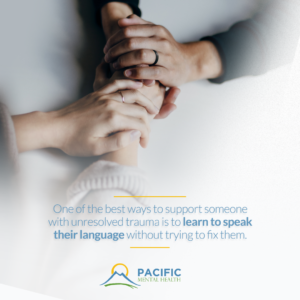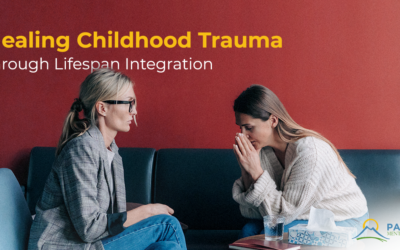
The Language of Trauma
As humans, we have an innate desire to make sense of the world. We are meaning makers who are compelled to communicate our lives to those we encounter. Language, stories, poetry, art, music, dance, and many other creative mediums serve to help us find ways to be witnessed and to witness the truths we and others hold. Trauma, however, can impair our ability to make meaning, to integrate memories, and to communicate effectively so that we can maintain connection and intimacy and experience flourishing. We need to understand the language of trauma. As van der Kolk (2014) elaborates, “Trauma by nature drives us to the edge of comprehension, cutting us off from language based on common experience or an imaginable past” (p. 43). During a traumatic experience, the language center of our brain–Broca’s area (van der Kolk, 2014)–shuts down in order to conserve fuel for the more important task of survival through our physiological responses of fight, flight, or freeze. In chronic and extreme cases, we may completely dissociate in order to bear what is unbearable. The consequence of this “shut down” is the inability to “organize one’s traumatic experiences into a coherent account–a narrative with a beginning, a middle, and an end (van der Kolk, 2014, p. 43). We may have survived, but without organization, integration, and a safe place to process memories, we may keep re-experiencing traumatic events as though they are still occurring, even long after they are over.

As a therapist, I work with many clients who have a history of trauma, and the harm they have endured is devastating. What is also heartbreaking is how clients have learned to manage and engage the aftermath of trauma through various coping mechanisms. One common theme I often see is the normalization of trauma. Living in the midst of trauma was so “normal” that they would never describe their experiences as traumatic. Trauma has become the air they breathe. Another common theme I observe is minimization. It is not uncommon for clients to describe details of chronic verbal, sexual and/or physical abuse, and then to immediately minimize their experiences with statements like “Others have had it worse” or “I’m making too big of a deal about this.” Clients will often move beyond normalizing and minimizing to directly questioning their own sense of reality and the truth of their experiences. They might wonder out loud, “Did this really happen to me?” Finally, the most common response I see is immense and sometimes debilitating shame, as evidenced in the way they blame themselves for what happened, and the degree of self-contempt I hear in their stories.
Trauma may impair our ability to communicate effectively, but these coping mechanisms are their own kind of communication, and speak to a desire to be seen and understood in the darkest places. The attempts at self-blame, normalizing, minimizing, or denial of the reality of trauma paradoxically confirm trauma’s truth and impact. They reveal an understandable need to maintain agency and control over the “too muchness” inherent in trauma; they reveal a valiant attempt to make meaning of that which is incomprehensible. They are adaptive responses that allow continued functioning and survival, often within a world in which those meant to care for and love them perpetuated the greatest harm.
We all want to be known and loved; we all need a witness to our lives.

One of the best ways to support someone with unresolved trauma is to learn to speak their language without trying to fix them. Instead of trying to convince someone they aren’t to blame, or being frustrated when they circle the wagon of denial, you can offer compassionate curiosity for their position and belief. You can recognize that although they are not to blame, somehow that belief is helping them cope in the moment. Your presence and acceptance in where they are right now is central to growth and change.
As humans, we are never not trying to communicate although much of what we “say” lies out of our own awareness. We need others to help us decipher what we are “saying.” People with a history of trauma are trying to speak, because like many of my clients, no one has been interested in knowing all of who they are. We all want to be known and loved; we all need a witness to our lives. The language of a traumatized life may be chaotic, frustrating, or even maddening, but with kindness, good listening, patience, and healthy boundaries, you will learn to hear what is being spoken. From that place, there can grow new hope and imagination for understanding, healing, and change.
van der Kolk, B. (2014). The body keeps the score: Brain, mind, and body in the healing of trauma. New York:Penguin Books.
Pacific Mental Health therapists and counselors are available to give you professional mental health support. Schedule your first visit with one of our therapists. You can also read additional articles written by our mental health professionals on mental health topics on our blog.








0 Comments